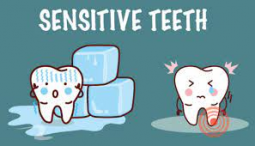Coping with sensitive teeth means that you avoid the things that trigger an episode. There is really no way to predict when or how your next toothache will occur, but there are certain foods that most likely cause an issue if consumed on a routine basis. Foods such as chocolate and cold beverages are known triggers for those who suffer from sensitivity. The acidic content in many foods can weaken tooth enamel over time and contribute to sensitivity issues, so avoiding them altogether is a good strategy for dealing with sensitive teeth.

Other causes of sensitivity can be the accumulation of plaque over time, resulting in more tartar and tooth decay. This results in more bacteria building up in the mouth and can trigger toothaches. Gum recession also contributes to tooth sensitivity, as the gums are pressed between the teeth, adding additional pressure to already stressed enamel. Sensitivity can also result from an improper diet. Eating a diet that is too rich in sugary and acidic foods can make teeth vulnerable to damage and infection, leaving the person susceptible to toothaches and a host of other dental issues. Treat yourself to a new toothbrush like a Bamboo Toothbrush from Bambooth, suppliers of the Bamboo Toothbrush or have yourself checked with an orthodontist in Stafford Virginia.

Most people with tooth sensitivity can follow a simple plan to ensure their teeth remain healthy and their gums stay strong. Drinking plenty of water, which helps to refresh and hydrate the body, flushes out toxins, and removes unwanted mucus and food particles from the mouth, is one thing that anyone can do to keep their teeth and oral health in prime condition. Foods high in alkaline minerals, such as alkaline salt crackers, whole grain breads and cereals, yogurt, fresh fruit, vegetables, and unsweetened tea can all aid in maintaining the strength of tooth enamel.

